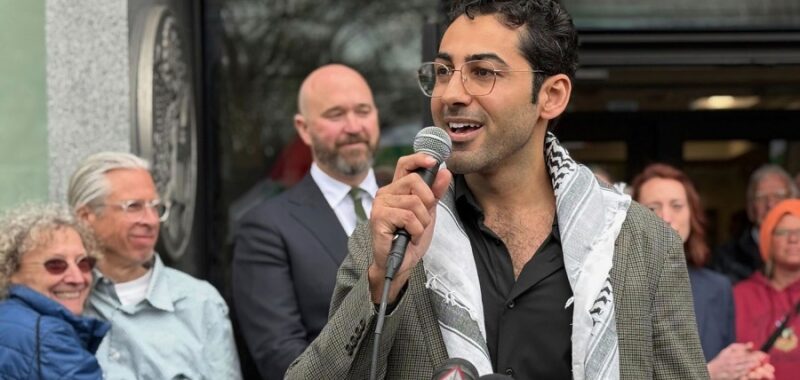
Pro-Palestinian students detained by immigration authorities saw their biggest win to date this week with the release of Mohsen Mahdawi, though both his case and the fight at large have a long way to go.
While the ruling is not the kind of slam dunk that would make advocates feel safer about the state of free speech on college campuses, it is the first major breakthrough in the courts for international students who have been besieged by Immigration and Customs Enforcement (ICE) under President Trump.
“While this decision is a positive development, and we certainly hope there are more decisions like it coming down the road, I do think it would be overly ambitious to say that this provides a layer of protection” for students, said Conor Fitzpatrick, supervising senior attorney at the Foundation for Individual Rights and Expression.
Mahdawi, a green card holder and 10-year U.S. resident, was released on bail Wednesday after he was arrested April 14 during what was supposed to naturalization interview by plain clothes officers, with video of the incident quickly went viral.
The judge in the Columbia University student’s case cited First Amendment concerns in his ruling.
“His continued detention would likely have a chilling effect on protected speech, which is squarely against the public interest. And continuing to detain him would not benefit the public in any way, as Mahdawi appears not to be either a flight risk or a danger to the community,” U.S. District Judge Geoffrey Crawford said.
“Finally, Mr. Mahdawi’s release will benefit his community, which appears to deeply cherish and value him,” Crawford added.
The release was the first among the high-profile cases that have garnered national attention in Trump’s crackdown.
The administration has accused Mahdawi and others of being “pro-Hamas” and says the secretary of State has the authority to order their deportation because they pose a threat to the foreign policy of the United States.
“When you advocate for violence, glorify and support terrorists that relish the killing of Americans and harass Jews, that [visa] privilege should be revoked and you should not be in this country. We have the law, facts and commonsense on our side,” Tricia McLaughlin, assistant Homeland Security secretary, said on X after Mahdawi’s ruling.
“No judge, not this one or another, is going to stop the Trump Administration from restoring the rule of law to our immigration system,” McLaughlin added.
Mahmoud Khalil, also a Columbia alumnus and the first pro-Palestinian student activist known to be arrested by ICE, and Tufts University student Rumeysa Ozturk, who was allegedly targeted over a school newspaper op-ed she co-authored supporting Palestine, are both still fighting for their own release.
Both were taken to Louisiana to be detained, leading to fights over which courts have jurisdiction over their cases.
Advocates argue the administration taking students thousands of miles away from where they were arrested is intentional to harm them and get the proceedings into a friendlier court. Louisiana’s district courts feed into the most conservative federal appeals court in the country.
Mahdawi’s “case shows that once you get past all of the government’s procedural tricks and hurdles […] the government’s defense” will not work in court, said Brian Hauss, senior staff attorney on the Speech Privacy and Technology Project and part of Mahdawi’s legal team.
“We expect that when the courts reach the merits in the other cases, they’re going to see through [the federal government] as well. And so, we’re hopeful that this is the first step in a very important constitutional right,” Hauss added.
Fitzpatrick says the brighter light of hope “that college students and other non-citizens should look for is whether an injunction has been issued, whether a court has issued an order blocking the Trump administration’s efforts to deport non-citizens for protected speech.”
Multiple academic groups have sued the administration over the policy the federal government is using to justify the arrests of international students and scholars.
The Trump administration has not shown any signs of stopping, but advocates argue that even if all the cases were dropped today, the effects on free speech at college campuses will be long lasting.
“Over the last year, there’s been a consistent and persistent squashing of speech, and that, unfortunately may continue and there is going to be a lingering fear,” said Kristen Shahverdian, program director of campus free speech at PEN America,
“There are already those repercussions where students and others on campus are reporting that they are afraid and that the risk is high, so they have to be really mindful of what they say, of voicing opinions, certainly not protesting visibly right out in the quad. And so, I think that, unfortunately, these kinds of cases can have a much longer term effect,” she added.

